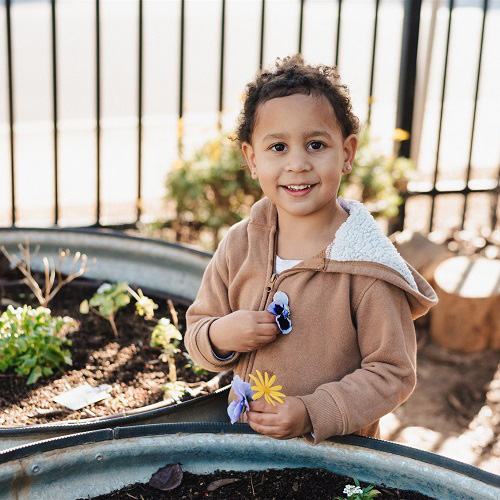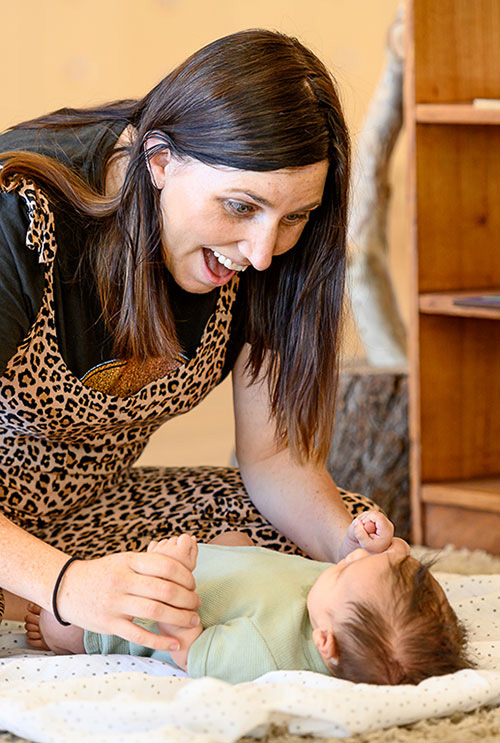On this page
The Australian Early Development Census (AEDC) is a national survey that looks at how young children are developing. It gives a picture of how children from birth through to 5 years old are doing in different communities.
What the survey measures
The survey measures the 5 areas of children’s development: physical, social, emotional, language and maths, and communication.
Developing well in these areas helps give children a strong start for their later health, education and social life as they grow up.
Want to dig deeper?

Why it’s important to understand and support how young children develop
In South Australia, we want every child to have the best start in life and a good education. We know that what children experience very early in life will shape their adult lives. That’s why supporting early childhood development is important.
Even before they’re born children's brains develop quickly. This time is vital for their future learning, behaviour and health.
When families can get the support and services they need, this helps them give their children good food, love and a home, keep them safe and healthy, and support their learning.
How the survey works
The survey happens once every 3 years. Reception teachers answer questions about the children in their class. They do this:
- on a secure website
- using what they know about the children and what they see.
Children attend class as usual. They don’t need to do anything special for the survey.
Video: Introduction to the AEDC (6:12)
The following video explains how AEDC data:
- is collected
- can pinpoint challenges for children in your community
- can be used to support your community.
Video transcript – introduction to the AEDC
What happens with the collected data
The data collected is:
- summarised for community, state and national results
- published on the national AEDC website
- kept secure at all times.
Children’s names, ages, addresses or schools aren’t published.
Where to view the results
You can find SA results and resources on our website or national results on the national AEDC website.
You can also find community profiles on the AEDC website.
How AEDC results can help your community, schools and other services
Schools, preschools, long day care services, communities and governments can use the information that the AEDC collects. The survey helps them:
- understand the factors impacting the development, wellbeing and learning of groups of children in communities, including:
- family life
- community
- services and supports available to children and families
- government policies
- beliefs and attitudes
- provide the right services and supports that children and their families need.
How families can support children's development
If you want to better understand what types of support families in your area might need to help their children thrive, you can look at AEDC results for the community where you live. Try:
- searching for your community on the AEDC data explorer
- find your community profile on the AEDC website.
You can also talk directly with your community organisations, local council, school, preschool or long day care service about how they might be using the community AEDC results and how you can get involved.
Tip: If you’re looking for funding for a community project, you can use AEDC results as evidence when applying for grant.
Here are tips for how you can support your child's development (on this page). You can also find more information for families on the national AEDC website.
Examples of how communities have been using the survey results
Here are some examples of action taken in response to AEDC results.
Video: Supported playgroups in the Lower Mid North – an education partnership story (4:13)
Video transcript – Lower Mid North education partnership story
Video: Mid Murray family connections (4:58)
This video shows how a network of over 60 stakeholders collectively responds to their community AEDC results.
Video transcript – Mid Murray family connections story
Community story: Strengthening parent participation in children’s early development in Balaklava
Read about how the community in Balaklava has been using AEDC results, working together to support local families and early child development in the community story strengthening parent participation in children’s early development in Balaklava.
Find more stories and initiatives:
- School stories
- Community stories
- local government early childhood community initiatives
- South Australian government
- Australian government initiatives.
How you can support your child’s early development
Everyone can help with children’s early development, wellbeing and learning.
What you do as a family has an impact.
You can help your child stay on track by:
- taking them to regular health checks – see Child and Family Health Service
- taking them to early childhood programs such as playgroup, long day care and preschool – find a service via StartingBlocks or Playgroups SA
- providing healthy and safe homes, nutritious food, loving relationships and supporting their learning – see parenting guidance below
- singing, talking reading and playing with them – check out Words Grow Minds for activities
- connecting with others and seeking support when needed – find support on ASK (Adults Supporting Kids)
- taking part in your child’s learning at home and elsewhere – we have plenty of resources for parent engagement on our website.
You can also:
- download the Early Years SA app – reliable information on child health, learning, development and wellbeing from birth to age 5
- find tips for supporting your child’s development in the different domains in the AEDC development guides below.


AEDC development guides
The fact sheets show examples for how you can support your child's development in the 5 AEDC domains:
- develop physical health and wellbeing
- develop social competence
- develop emotional maturity
- develop language and cognitive skills
- develop communication skills and general knowledge.
More resources for families
Parenting guidance
- Parenting SA – practical guides and short videos about raising children
- Raising Children Network – parenting videos, articles and apps backed by Australian experts
Activities
- GreatStart – everyday ideas and activities for learning
- Our Learning SA – resources for families and children to continue learning between school and home
- Bright Tomorrows app – 1000s of ideas to help build a child’s brain
- Learning Potential – tips and ideas about helping your child’s learning
- Let's Read – tips and tools to promote reading with young children
- Nature Play South Australia – inspiration for places to connect and recharge
- Words Grow Minds – supports early brain development through words
Children’s services and support
- ASK (Adults Supporting Kids) – connects parents and caregivers to information, free local support services and other contacts to support children and young people
- Child and Family Health Service – find out about free health checks for your child
- Community centres – public spaces where people can gather for group activities that are focused on inclusion, wellbeing and social support
- Local councils – provide services and supports for families including public libraries
- National Disability Insurance Scheme – how to get support if you have concerns about your child’s development
- Playgroup SA – services and support for families with young children
- SPICE Playgroups – supported playgroups in Catholic Education
- Starting Blocks – provides parents with information about early childhood education and care and lists early childhood programs such as playgroup, long day care and preschool


